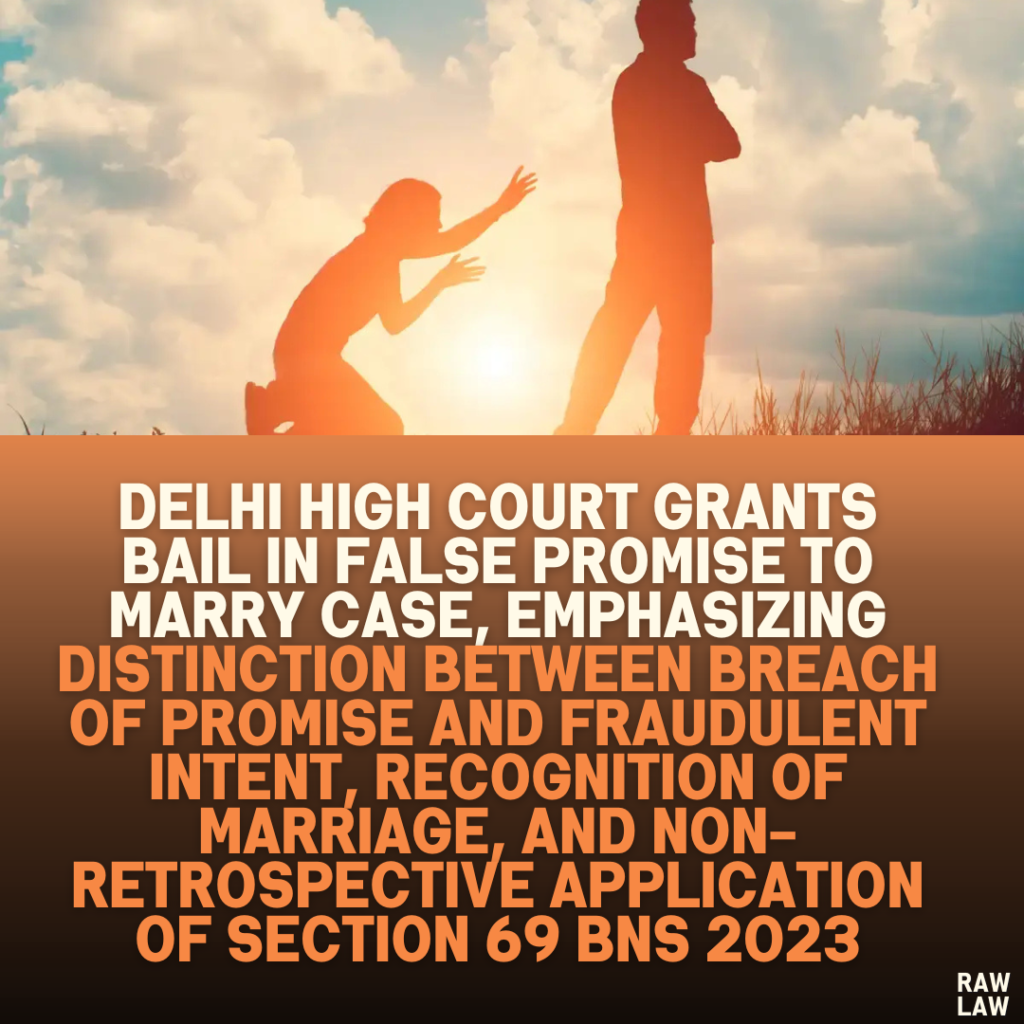Court’s Decision:
The High Court granted regular bail to the petitioner, considering the evidence that supported the claim that a marriage had taken place. The court reasoned that the facts did not conclusively establish that the petitioner had no intention to marry from the beginning. As a result, bail was granted under specific conditions, including the requirement that the petitioner:\n
- Furnish a personal bond of Rs. 25,000/- with one surety of the like amount.
- Appear before the trial court whenever required.
- Maintain a working mobile number and not change it without informing the investigating officer.
- Avoid engaging in any criminal activity.
- Refrain from contacting the complainant or the witnesses.
The court emphasized that these findings were limited to the bail application and should not be interpreted as an opinion on the merits of the case.
Facts of the Case:
- The petitioner was arrested in connection with an FIR registered under Section 376 IPC (rape), where the complainant alleged that the petitioner established physical relations with her based on a false promise of marriage.
- The complainant claimed that she and the petitioner had met through their families with the intent of marriage, maintained regular contact, and traveled together.
- The petitioner argued that he had married the complainant on January 21, 2024, at an Arya Samaj Mandir, which was confirmed in the State’s status report.
- The complainant later alleged that the petitioner had married another woman, casting doubt on his intent.
- The prosecution contended that some of the alleged incidents took place after the new penal law (BNS 2023, Section 69) came into effect on July 1, 2024, which criminalizes sexual intercourse obtained through deceitful means.
Legal Issues Before the Court:
- Does the petitioner’s conduct amount to an offense under Section 376 IPC (rape) or Section 69 BNS 2023?
- Did the petitioner have a fraudulent intention from the beginning, or was this merely a breach of promise?
- Is the custodial interrogation of the petitioner necessary for the investigation?
- Is the petitioner a flight risk or a repeat offender?
Petitioner’s Arguments:
The petitioner’s counsel argued that:
- The relationship between the petitioner and the complainant was consensual.
- The marriage was solemnized on January 21, 2024, as proven by a marriage certificate from Arya Samaj Mandir.
- The complainant acknowledged the marriage in her statement to the CAW (Crime Against Women) Cell, which weakens the allegation of false promise.
- The petitioner had no criminal record and was in custody since November 2024, making further incarceration unnecessary.
- Since the case is based on legal interpretation rather than fresh evidence, custodial interrogation was not required.
Respondent’s Arguments (Prosecution’s Case):
The prosecution countered these arguments by stating that:
- The petitioner induced the complainant into sexual relations by falsely promising marriage.
- Multiple incidents of physical relations took place during their trips together, proving a pattern of deception.
- Section 69 of BNS 2023 applies to any such deception occurring after July 1, 2024.
- The complainant claimed that the petitioner later married another woman, which, according to the prosecution, demonstrated his fraudulent intent.
Court’s Legal Analysis:
The court analyzed the law concerning false promises to marry and examined whether the petitioner’s actions constituted an offense under Section 376 IPC or Section 69 BNS 2023.
Key Legal Considerations:
- Distinction Between Breach of Promise and Fraudulent Intent:
- A breach of a promise to marry does not automatically amount to rape unless it is proven that the accused never intended to marry from the beginning.
- The Supreme Court, in Deepak Gulati v. State of Haryana (2013), ruled that only false promises made with malafide intent amount to rape.
- Timing of the Alleged Offense and the New Law (BNS 2023, Section 69):
- Section 69 of BNS 2023 criminalizes sexual relations induced by deceit, including false promises of marriage.
- However, this law came into effect on July 1, 2024, while the alleged marriage took place in January 2024.
- Since the marriage was confirmed in the State’s report, the applicability of Section 69 BNS 2023 was doubtful.
- Analysis of Supreme Court Precedents:
The court cited the following cases:\n- Deepak Gulati v. State of Haryana (2013) – Held that only cases where an accused had mala fide motives from the start amount to rape.\n
- Pramod Suryabhan Pawar v. State of Maharashtra (2019) – Clarified that a false promise must be intended to deceive at the outset.\n
- Anurag Soni v. State of Chhattisgarh (2019) – Reiterated that if a man never intended to marry but induced a woman into sexual relations, it vitiates consent under Section 375 IPC.\n
Court’s Reasoning for Granting Bail:
- The prosecution’s own status report confirmed that a marriage took place.
- The complainant acknowledged the marriage in her official statement.
- There was no conclusive proof that the petitioner never intended to marry from the start.
- Section 69 BNS 2023 could not be applied retrospectively to events that occurred before July 1, 2024.
- The petitioner had no prior criminal record and had a stable job, making flight risk unlikely.
- The court found no necessity for further custodial interrogation.
Conclusion:
The court ruled in favor of granting bail, emphasizing that:
- The petitioner’s marriage to the complainant weakens the allegations of deception.
- No strong evidence suggests that the petitioner had a fraudulent intent from the beginning.
- The question of whether Section 69 BNS 2023 applies should be decided during trial.
Implications of the Judgment:
- Clarifies the legal distinction between breach of promise and deception.
- Reiterates the need for strong evidence to prove fraudulent intent in false promise cases.
- Highlights that new laws (like Section 69 BNS 2023) cannot be applied retrospectively.
- Ensures that bail is granted when custodial interrogation is unnecessary and the accused does not pose a risk.
